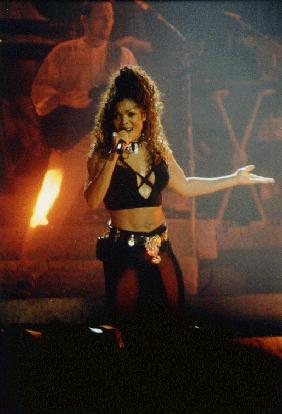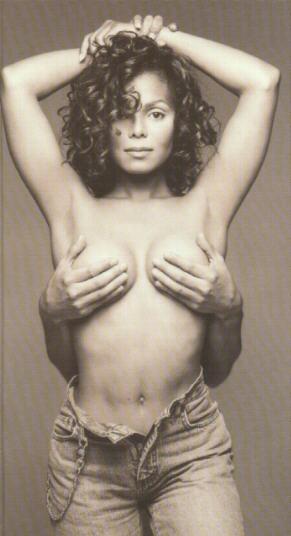

"Self-expression is my goal." says Janet Jackson. "I want to be real with my feelings. Singing and dancing-and all the joy that goes with performing-come from my heart, If I can't feel it, I won't do it." Janet's artistry is about honesty - Janet's artistry is about spirit - Optimism.
The sheer delight of movement. The strong allure of romance. The realities of heartache and discrimination. The pain of loss. The power of love. The finesse of funk.

Janet's artistry is about courage and candor and the unapologetic ambition to fulfill a potential. The drive to expand a creative vision. Taking it to the edge; growing upward; moving ahead. . .
Although her soft-spoken demeanor and casual grace are the twin hallmarks of her personal style, ultimately, it is Janet Jackson's strength, compassion, courage, confidence, sincerity and passion which have shaped her professional career and evolving artistry.
Able to capture raw, intimate feelings and bridge the gap between conflicting themes-strong yet vulnerable, serious yet playful, sensual yet spiritual, self-assured yet searching-Janet explores the mercurial nature of human emotions, emotions all of us experience in our own lives.
Whatever
the topic-the power of sisterhood, the courage of conviction, the pursuit
of new challenges, or the  intricacies of love-Janet connects with the audience on a very personal
level, evoking a powerful reaction among tens of millions of fans worldwide.
intricacies of love-Janet connects with the audience on a very personal
level, evoking a powerful reaction among tens of millions of fans worldwide.
As a result, Janet has earned an unprecedented blend of accomplishment and respect, as illustrated by four consecutive multi-platinum albums, scores of chart-topping singles, dozens of honors and awards, and far-reaching critical acclaim.
THE CAREER
A few statistics help illustrate the point. Janet has sold over 40 million albums worldwide. Her 16 gold-certified singles are among the most of any female recording artist in history. Her first-ever world tour in 1990, became the most successful premiere tour by any artist, with over two million fans attending the record-breaking performances.

The magnitude of her artistic and commercial success is exceeded only by the sheer scope of her pursuits as a singer, songwriter, producer, actress and fashion trendsetter. Janet's award winning videos testify to her cutting-edge choreography, athleticism, dancing, and all-around visual flair.
Moreover, her critically acclaimed film debut as "Justice," the lead female role in director John Singleton's compelling 1993 film "Poetic Justice," marked Janet's emergence as an actress of uncommon poise. The film debuted at #1, with over 13 million tickets sold its first weekend."
Amid
all her career accomplishments, it's important to recognize Janet's
humanitarian efforts. Her compassion is unequaled. She is a drum major
in giving, not only financially but, of herself. Through her generosity
, she has made an indelible imprint on the lives of many in this country,
and around the world, who are in need. She seeks no recognition but
the satisfaction of knowing that her efforts helped to make a positive
impact on someone else's life. A strong advocate for children, education,
civil and human rights, and AIDS research, the many organizations Janet has supported include: the Starlight Foundation,
Congress of Racial Equality, NAACP, Make-A-Wish Foundation, American
Foundation for AIDS Research (AMFAR), Cities In Schools, Americare,
and the United Negro College Fund. Additionally, she works closely with
the Watts (LA)- Willowbrook YMCA and, "A Place Called Home," a transitional
home for abandoned and abused children located in South Central LA.
organizations Janet has supported include: the Starlight Foundation,
Congress of Racial Equality, NAACP, Make-A-Wish Foundation, American
Foundation for AIDS Research (AMFAR), Cities In Schools, Americare,
and the United Negro College Fund. Additionally, she works closely with
the Watts (LA)- Willowbrook YMCA and, "A Place Called Home," a transitional
home for abandoned and abused children located in South Central LA.
THE BUSINESSWOMAN
Janet Jackson is an astute businesswoman. She is involved as well as makes the final decision regarding every aspect of her multi faceted career -- from the material she sings to the choreography, marketing, and contract she signs. A 24 year veteran of the entertainment industry she has experienced, first-hand, the joys, the pain, the disappointments, the accomplishments-- and, has emerged strong, and in control. It was she who in 1991, in her mid twenties, negotiated a multi million dollar, one record deal with Virgin Records, the only artist in recording history to do so.
Subsequently,
it was she who led the negotiations which resulted in her signing a
multi year album deal with Virgin Records, one of the biggest--and most publicized--record
deals in recording history. President and CEO of JDJ Entertainment,
which oversees her vast projects, Janet intends to diversify even more
into television and film production.
with Virgin Records, one of the biggest--and most publicized--record
deals in recording history. President and CEO of JDJ Entertainment,
which oversees her vast projects, Janet intends to diversify even more
into television and film production.
THE GOAL : FREEDOM
To all of her pursuits, Janet brings a charisma, and breadth of talent which places her among the foremost icons in the history of popular culture. But unlike many other artists, Janet's work is fueled by her own distinctive life experiences: virtually every facet of her career and her art offers a glimpse into the essence of her evolving self identity. During the past decade, we have seen Janet step forward as a youthful spirit, youthful woman, and youthful African American woman -- a multi- dimensional character, but singular in her determination to sing sincerely about freedom.

Freedom -- personal freedom to explore one's destiny, political freedom to realize one's potential, sexual freedom to enjoy one's body -- provides the central theme which has unfolded and blossomed in Janet's life and music.
THE STORY SO FAR
Janet, a 2-syllable girl's name of Hebrew origin, means: Gods gracious gift. The names ethnic backgrounds include English/Welsh, Scottish.
Janet Damita Jo Jackson was born May 16, 1966 in Gary, Indiana. She's the youngest of 9 children born to Joe and Katherine Jackson. She was always a tomboy as a child- a little chubby, and given to roughousing. Her first desire was to be a horse-racing jockey. Older brother Michael nicknamed her Dunk, short, he said, for "donkey."
Growing up in the Jackson family, Janet must have become aware of the lures of performance early on. Since the Jackson 5 were already stars by the time Janet was an adolescent, it may never have occured to her that it was possible to fail in show business. She had an experience of life completely different from what her brothers and sisters may have known as a poor Indiana family. She was perhaps the most protected child in the family, as the youngest often is.

As she grew, her interests branched in several directions- dancing, acting, singing. She was clearly a performer, but of what kind? She first appeared on stage in her brothers show in 1973- at the age of seven. In 1977, Norman Lear offerred her a job as Penny Gordon Woods on Good Times, on CBS.. After that, she appeared on a few shows, Diff'rent Strokes and A New Kind of Family among them. She was doing sitcom acting: not terribly challenging, but highly paid, with good exposure. And as a Jackson child, how could one not draw exposure? Brother Michael was already solo and tearing upp the charts with Off the Wall.
In 1982,
she released her first album, Janet Jackson. It wasn't bad for a first
effort, especially for a sixteen-year-old, but it played it very safe
Janet had yet to find a style, or an audience. (Although lately some
of these early songs has become favorites to many of Janet's truly dedicated
fans.)  She toured the toured the country, performing in high schools and encouraging
the kids there (who were, in fact her peers) to stay in school. During
the tour, she went with her mother to see The Time perform. Two members
of the band- Jimmy Jam and Terry Lewis- will become major figures in
her career.
She toured the toured the country, performing in high schools and encouraging
the kids there (who were, in fact her peers) to stay in school. During
the tour, she went with her mother to see The Time perform. Two members
of the band- Jimmy Jam and Terry Lewis- will become major figures in
her career.
In 1983, she got a role on Fame. The show remained one of the most critically praised shows on TV- and one which somehow had maintained itself as a showcase for singing and dancing, as well as acting and writing. Anachronistic though a musical format may have seemed, the show was much like the high school it portrayed: encouraging talented performers to stay a while and learn before moving on.
During her time at Fame, she remained protected (not surprising, considering she was still a minor at the start of the season) and her parents were often on the set.

In 1984, Janet, aged 18, eloped with singer James DeBarge and married him. Pressures from a number of different directions intervened- her record company, the demands of her schedule, her youth. By the following March, she moved back in with her parents and had the marriage annulled. Also 1984, Janet released her second album, Dreamstreet. Inflected by the dance-pop of the time (it was produced with help from Giorgio Moroder, of Flashdance fame), it was a little more than a statement of musical presence on Janet's part: I'm here, I'm making music, heads up. It was not well-received.
The
album peaked at #147 on the charts and Janet retreated to think about
her  next album. She listened to other songs, worked intensively with songwriters
and producers, and cultivated a coherent sound which had been lacking
the previous effort. This sound is still recognizable in Janet's music:
a blending of the sharp opening phrases and commanding basslines of
funk with the melodic sence of soul, and the rhythm backing of 80s dance-pop
and, later, rap.
next album. She listened to other songs, worked intensively with songwriters
and producers, and cultivated a coherent sound which had been lacking
the previous effort. This sound is still recognizable in Janet's music:
a blending of the sharp opening phrases and commanding basslines of
funk with the melodic sence of soul, and the rhythm backing of 80s dance-pop
and, later, rap.
The album that pulled these things together was 1986's Control. It was her first album with Jimmy Jam and Terry Lewis. It transformed all of their careers. It hit number one, putting six singles on various charts. Among the charts that Janet simultaneously occupied the #1 possition on were dance, black and pop- which describe the meld the album achieved. It took the hard beat background and laid a funk-riff melody over it. . .
The
album was agressive, in tone and melody. It was a clear stepping out
from behind her parents and bothers coattails. "What Have You Done For
Me Lately" is the voice of a woman taking control of her voice and her
man, "Control" (the title track) being what the album is all about.
The album was all about Janet and who she wanted to be. It was sexier
than any past album, enough to disturb her mother a bit. Janet knew
it would, but weighed her need to get out of the nest against that,
and that need won. The singles from the album just kept comming: five
of the tracks from the album became top 5 pop hits. Janet  spentmost of 1986 and 1987 supporting the album and remixing the songs
into dance versions. (Many of these versions were released as Control
- The Remixes.)
spentmost of 1986 and 1987 supporting the album and remixing the songs
into dance versions. (Many of these versions were released as Control
- The Remixes.)
Rolling Stone reviewer Rob Hoerburger called Control "a better album than Diana Ross has made in five years." Ms. magazine named the album one of the musical landmarks of the past 20 years.
By 1989,
Janet released her next album, Rhythm Nation 1814. What exactly did
1814 mean? Well, R and N are the 18th and 14th letters of the alphabet,
respectively... but that wasn't quite it. If, as People reviewer Ralph
Novak claimed, Janet was "making a strident declaration of independence"
with  Control, Rhythm Nation was a few years down the road. 1814 refers to
the year that Francis Scott Key wrote the "Star Spangled Banner," and
the album was about some of the troubles of this Rhythm Nation. She
said at the time, "Control was about my life; Rhythm Nation is about
what's going on in the world around us."
Control, Rhythm Nation was a few years down the road. 1814 refers to
the year that Francis Scott Key wrote the "Star Spangled Banner," and
the album was about some of the troubles of this Rhythm Nation. She
said at the time, "Control was about my life; Rhythm Nation is about
what's going on in the world around us."
Rhythm Nation was accompanied by a long-form video project, encompassing a number of the songs from the album, in a conceptually coherent form. It's a morality play featuring two young shoeshine boys, which director Dominic Sena tried to film in the style of a vintage musical. The tour that followed was much of a production: huge, expensive, and theatrical.
If some
of the tracks on Control and Rhythm Nation 1814 were hard for mother
Katherine to take, janet, the 1993 follow up, should, as Michael Odell
put it,  "turn her to the bottle... she really puts the bedsprings through their
paces." The album retains the assertiveness of Control, the political
awareness of Rhythm Nation, and adds a frank sexual tone. The Brittish
publication VOX said that "Musically, she touches all bases; lyrically,
she hardly gets out of the sack."
"turn her to the bottle... she really puts the bedsprings through their
paces." The album retains the assertiveness of Control, the political
awareness of Rhythm Nation, and adds a frank sexual tone. The Brittish
publication VOX said that "Musically, she touches all bases; lyrically,
she hardly gets out of the sack."
Around the same time janet was released , she starred in John Singleton's Poetic Justice. The film, about the meaning of poetry and love in an urban setting, gained Janet some respect for her acting. Oddly enough, she had attended the same junior high school as John Singleton. "I remember him as this little kid with 'Coke bottle glasses,' who had all these books," Janet said. "After meeting on the set of Steven Spielberg's Hook, we got together and it all just happended from there."
Since then, she's spent time building her acting skills, writing songs, and maintaining relationships. She remains close with Michael still, as kids they'd play piano together. She still talks to him mornings, supported him in public during his roughest times. The key she wears on an earring is a gift from him, it was to the cage of a bany deer they took care of as kids. One day, he attached it to the earing, and she has left it there.

Janet joined her brother Michael on the 1995 hit single "Scream" (which entered the pop chart at #1) and appeared in the song's stunning glam/sci-fi video clip. And in 1996, Janet's single "Runaway," one of two brand new songs featured on the hit-filled retrospective Janet Jackson 1986/1996 Design of a Decade, became her 16th gold-certified single, placing her among an exclusive league of female artists.
VISION FOR THE FUTURE
Today, Janet is poised to explore new avenues of artistic expression, guided by her credo: "You have to find your own muse and stir the people with your soul." In autumn 1997 she released "The Velvet Rope," one of the most anticipated albums to be released in music. As a new millennium dawns, the inspirational core of ideas Janet has promoted throughout both her personal and professional life - humanity, excellence, education and hope, are more relevant, more urgent than ever before. And, rest assured, Janet will embrace them with an even greater sense of determination and creativity in the exciting years ahead.




All For You

The Velvet Rope
Links & Lyrics